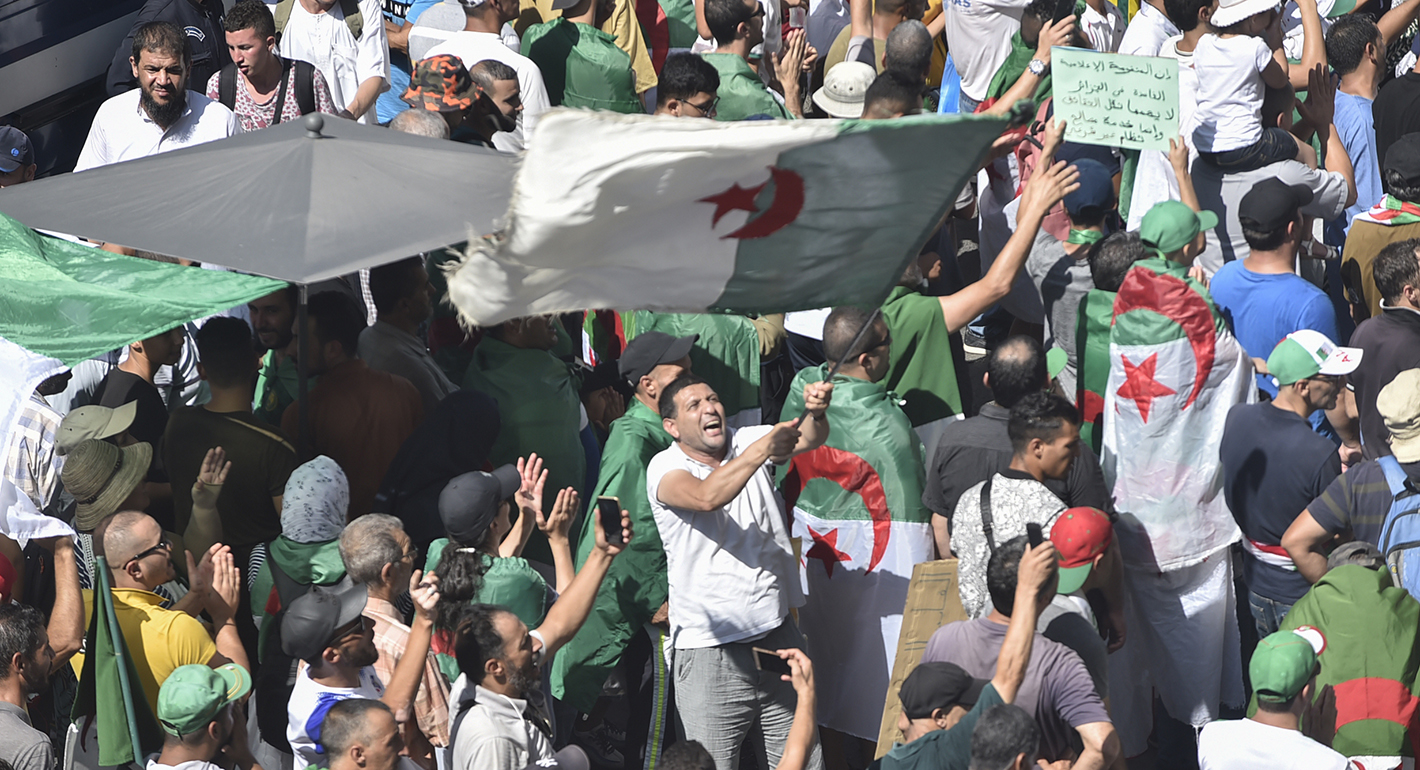Source: Konrad-Adenauer-Stiftung
State of Affairs
Algeria, the largest country in Africa by land area, one of Europe’s top three gas suppliers and a pivotal security actor, has been shaken by mass protests since February 22, 2019. These peaceful and civic protests were born from Algerians’ resentment towards their ailing eighty-two year old President Abdelaziz Bouteflika’s decision to run for a fifth term after twenty years in power. For twenty-five consecutive weeks, Algerians of all ages and classes have been demonstrating every Friday throughout the country to show their disapproval to their leaders and to demand an overhaul of their political system.
The leaderless movement took the regime off guard and compelled the military, headed by the Chief of Staff and Vice-Minister of Defense Ahmed Gaïd Salah, to shift its loyalty. Within five weeks, the military abandoned President Bouteflika and pushed him to step down. In application of article 102 of the constitution, Head of the National Popular Assembly (APN) Abdelkader Bensalah was appointed interim president in a caretaker government.
In addition, the military pressured several personalities close to former President Bouteflika to resign, such as Prime Minister Ahmed Ouyahia and his predecessor, Abdel Malek Sellal. Other figures such as former intelligence chief, Athmane Tartag, and former head of the Department of Intelligence and Security (DRS), General Mohamed Mediene, were arrested along with several business tycoons who were detained on corruption charges.
Despite these measures, Algerians have not quieted. A majority of protesters perceive these actions to be purges conducted by the military leadership to cast off rivals and square accounts with foes. Protesters are asking for the resignation of Bensalah and his caretaker government. They are also demanding a longer transition period and no elections for the moment. While the last point is valid — as current conditions are not conducive to free and fair elections, other demands remain vague and inoperative. For instance, the demand for a longer transition period did not develop into a clear roadmap with a defined timeframe. Similarly, the insistence on the departure of all figures and civil servants who served under Bouteflika is unlikely to occur. Moreover, there is no agreement on who should head the state in a post-Bouteflika era. In addition, the movement’s obstinate commitment not to have leadership (even a collegial one) to draft concrete demands and open a dialogue with the authorities is a complicating issue.
However, small steps have been made. Indeed, on June 15, the “National Conference of the dynamics of the civil society” was held. It was composed of over one hundred people coming from the Confederation of Autonomous Trade Unions, which includes thirteen unions and other corporate groups; the Civil Forum for Change, composed of seventy local and national associations; and finally, the Collective of the Civil Society, which brought together twenty organizations and unions. This is a first step as participants agreed for the first time on a transition period between six months and a year while they remain uncertain about the way forward and the prerequisites to opening dialogue with authorities. As for the opposition, its efforts to surf on the wave of the popular movement and to convince people of their capacities have all failed miserably. More recently, some figures of the opposition established the National Coordination for Change (CNC), a group composed of socialists as well as Islamists. It was brazenly rejected by the popular movement and failed to reach a consensus.
On the other hand, the military’s attitude towards the people’s demands, their intransigence, and their bureaucratic rigidity to insist on organizing elections despite the absence of candidatures, an opaque legal framework and the weakness of the judiciary are all highly problematic. Moreover, the military is showing signs of increasing assertiveness. The authorities banned all protest and public assembly, with permission only granted on Fridays. In one of his latest statements, while insisting on “the convergence of visions between the Army and the people”, Gaïd Salah, required demonstrations to be “characterized by a reasonable and sufficient level of organization and effective supervision” and urged the people to stop “certain irrational demands, such as the collective departure of all State officials”.
Gaïd Salah also condemned protest demands as being “non-objective and unreasonable” and even “dangerous and malicious”. Nonetheless, the obstinacy of Algerians seems even stronger than that of the military leadership as Algerians reaffirmed their demands. Demonstrations are expanding and have remained peaceful despite police provocations. Since April, the police have been acting more firmly with measures such as repressing and jailing protesters. The police are also increasingly using tear gas, rubber bullets, water cannons and Long-Range Acoustic Device (LRAD) commonly called “sound canons”. The signs of the intransigence of the leadership are clear and the risk of the use of coercive measures in the upcoming weeks to suppress peaceful protesters cannot be ruled out.
The full article, originally published by the Regional Program Political Dialogue South Mediterranean of Konrad-Adenauer-Stiftung can be found here.







